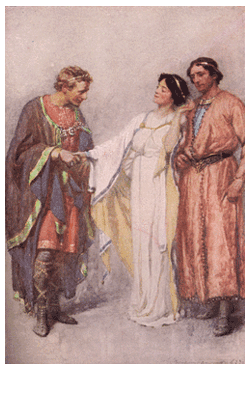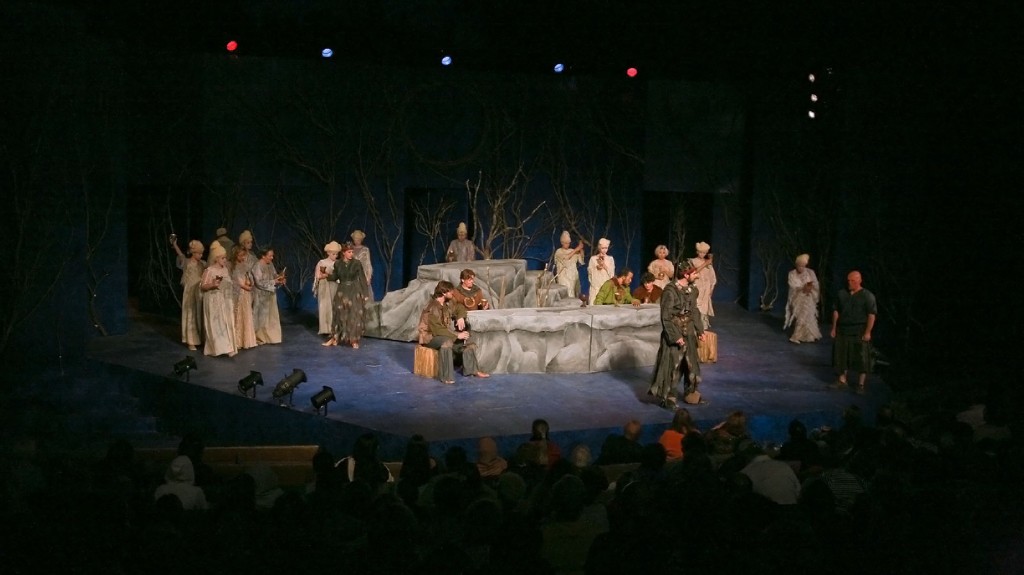
The Winter’s Tale is one of William Shakespeare’s later plays, called a romance because it combines comedy and tragedy, and has a happily-ever-after ending full of magic and mystery. In our version, it is the character of Time who is our guide through this magical tale, and he starts the story with:
I am that all–devouring Time,
And this is my tale. A tale of glad and sorry seasons.
A tale of winter and eternal summer.
A tale of Sicilia – and Bohemia.
Our story begins in Sicilia, where King Leontes, his beautifully pregnant Queen Hermione and their young son Mamillius are a happy family. Leontes’ best friend and childhood playmate is Polixenes, the King of Bohemia. Polixenes has been in Sicilia for an extended visit and when Polixenes insists on returning home, Leontes asks Queen Hermione to try to make him stay longer. Hermione does her best to convince Polixenes, saying: ‘You shall not go. Will you force me to keep you as a prisoner, not like a guest? How say you, for one of them you shall be.” Eventually Polixenes relents and agrees to stay. When Hermione tells her husband the good news, Leontes is outwardly overjoyed, but in an aside he confides to the audience a very different story: ‘Too hot, too hot! To be paddling palms and pinching fingers / As now they are and making practiced smiles!” Leontes becomes consumed with an irrational jealousy.
Enter Camillo – the calm, cool and collected advisor to the king. When Leontes asks Camillo if he has noticed the love between Hermione and Polixes, Camillo is shocked and assures the king he is mistaken. But Leontes is filled with rage and will not listen to reason. He asks Camillo to poison Polixines: ‘Fetch off Bohemia for’t: Bespice a cup to give mine enemy a lasting wink.” NowCamillo begins to understand the gravity of the situation and, for the moment, agrees to poison Polixenes, provided Leontes take no legal action against the queen once Polixenes is dispatched. Leontes leaves in assurance that Polixenes will soon be out of the way.
Alone, Camillo bemoans his terrible predicament – kill a friendly king as ordered by a jealous king or disobey his ruler and risk Leontes’ wrath coming down upon his head too! Which is more important – loyalty or doing the right thing? Camillo decides he cannot kill Polixenes and must flee Sicilia. When Polixenes enters, sensing something is wrong with Leontes, Camillo finally admits: ‘I am appointed him to murder you. / By the king. / He thinks, nay, with all confidence he swears, / As he had seen’t, that you have touch’d his queen forbiddenly.” Polixenes is horrified, and the two make plans to leave Sicilia immediately and flee to the safety of Bohemia.
In the castle, Queen Hermione and her ladies play with the high-spirited Prince Mamillius, but the sudden entrance of Leontes interrupts the peaceful scene. He commands Hermione to turn the prince over to him and, when she protests, he orders the prince be barred from seeing his mother and publicly proclaims that the child Hermione carries is the bastard son of Polixenes. Having learned of Camillo and Polixines’ flight, Leontes also accuses Hermione of treason in conspiring with Camillo to kill Leontes! Hermione protests her innocence but Leontes, blinded by jealousy, commands her arrest, though she is about to deliver the baby, and she is taken to jail to await trial. In order to ease the conscience of his court, Leontes dispatches messengers to the Oracle at Delphi to bring back a message from that spiritual center that will prove the ‘truth’ of his accusations.
Time passes and Paulina, a lady of the court and friend to Hermione, goes to the prison to visit the queen. The jailer refuses to admit Paulina to see Hermione, but one of Hermione’s ladies is allowed to meet with Paulina and tells her that Hermione has delivered a baby girl in prison. Paulina receives permission to take the baby from the prison cell by claiming that the child is innocent and therefore need not be kept in jail. She plans to show the newborn to Leontes, hoping his heart will soften at the sight of his baby girl.
Leontes, meanwhile, is speaking with Paulina’s husband Antigonus, still fuming because he believes his wife is an adulteress and his best friend her lover. Paulina, with the baby princess in her arms, approaches the king, laying the child before him. But Leontes is too far steeped in jealousy and throws Paulina out, proclaiming: ‘It is the issue of Polixenes: hence with it, and together with the dam / Commit them to the fire.” When Antigonus begs Leontes to spare the child’s life, Leontes forces him on pain of death to take the baby out into the wilderness and leave it for the wild animals to kill. As Antigonus leaves with the baby, Leontes receives word that the messengers have returned from the Oracle of Delphi and Leontes announces it is time for the Queen’s trial.
In the courtroom, the indictment is read, accusing Hermione of adultery with Polixenes and treason by conspiring with Camillo to kill Leontes. Hermione, still weak from childbirth, defends herself eloquently, saying she loved the Bohemian king as the best friend of her husband, but no more; that she is ignorant of any conspiracy; and that Camillo is an honest man. Leontes, paying little heed to her words, declares she is guilty, and her punishment — death. Hermione, knowing her husband is making a terrible mistake, says death would be a blessed release from the shame and misery of her present life. She commends herself to the Oracle’s judgment. Finally, the Oracle is read to the courtroom: ‘Hermione is chaste, Polixenes blameless, Camillo a true subject, Leontes a jealous tyrant, his innocent babe truly begotten, and the king shall live without an heir if that which is lost be not found.” At that moment, one of Hermione’s women enters with news: young Prince Mamillius is dead. Hermione swoons and is taken away while Leontes, shocked into seeing the truth, begs pardon of Apollo and admits his own faults. But, as fate would have it, his understanding comes too late. Paulina returns with the news that the Queen, upon hearing of her son’s death, has died herself. With his wife and children gone forever, a repentant and half-mad Leontes is left to arrange the funeral preparations for his wife and son.
From here, our story soars to the shores of Bohemia, where Antigonus has arrived with the girl-child he is to leave to the fate of the elements. As an ominous storm kicks up, Antigonus tells us he had a dream that Hermione appeared to him and told him to call the child ‘Perdita,’ which means ‘lost.’ As Antigonus lays the baby down, he hears the clamor of a ferocious bear and what follows is Shakespeare’s most famous stage direction: ‘Exit, pursued by bear.’ So baby Perdita is left alone in a dangerous Bohemia and the faithful Antigonus bids the world farewell.
As the storm dies down, an Old Shepherd stumbles upon the babe and decides to ‘take it up for pity.‘ His son enters, excitedly telling how he saw Antigonus mauled and killed by the bear while the ship that brought him was destroyed by the storm. The Shepherd discovers gold and other treasures wrapped up in the baby’s swaddling clothes and suspects that it is an illegitimate child of a wealthy courtier. The Shepherds decide to take her home, along with the treasures.
Now sixteen years pass. Time tell us what has happened during those sixteen years. In Sicilia, King Leontes continues to rule in sorrow and penance without wife or children. Paulina remains by his side, caring tenderly for the aging king, while never allowing him to forget the despair he has caused. In Bohemia, Polixenes’ son Prince Florizel, hunting in the forest, has met and fallen in love with Perdita, the lovely, gracious daughter of the Old Shepherd (who we know is really Leontes and Hermione’s lost daughter.)
Polixenes and Camillo have developed a loyal friendship and Camillo has served Polixenes well with his wise council. Now Camillo is homesick and asks permission to return to Sicilia and the repentant King Leontes. Polixenes doesn’t want to lose his trusted councilor and quickly changes the subject. He asks after his son Florizel, who has been disappearing from the palace regularly of late. Polixenes has heard that Florizel has been spending a lot of time at the home of an Old Shepherd who is reputed to have an exceptionally beautiful young daughter. Polixenes decides that he and Camillo will disguise themselves and go to the Old Shepherd’s home to see what the young prince has been up to.
Meanwhile, in the Bohemian countryside, a jovial vagabond, peddler, master of disguise, and petty thief named Autolycus is wandering along a highway singing happily to himself. Autolycus is a former servant to Prince Florizel who has fallen out of favor (no doubt for stealing and other character flaws). When he spies the Old Shepherd’s son counting a substantial sum of money, with which he plans to buy supplies for a country sheep shearing festival, Autolycus pretends to be the victim of a highway robbery. As the young Shepherd helps him, the crafty thief picks his pocket. After the young Shepherd has gone on his way, Autolycus resolves to make an appearance disguised as a traveling peddler at the sheep shearing festival where there will be many more pockets to pick.
At the Shepherds’ cottage, preparations are underway for the sheep shearing festivities. Perdita is dressed as the Queen of the festival. Florizel is calling himself Doricles so that no one will know he is the Prince, although Perdita knows his true identity and is concerned the King will oppose their betrothal, as she is a mere shepherdess. Florizel, caring little for his father’s blessing, calms her with a promise of marriage just as everyone arrives for the party, including King Polixenes and Camillo in disguise.
The Old Shepherd instructs his adopted daughter to act as hostess and she busies herself distributing greetings and flowers to the guests. Polixenes is impressed with her grace and says she is ‘the prettiest lowborn lass that ever / ran on the greensward. Nothing she does or seems / But smacks of something greater than herself, too noble for this place.‘ However, a shepherd’s daughter is still a shepherd’s daughter – and not nearly a good enough match for the crown-prince of Bohemia!
After some high-spirited dancing, Autolycus arrives, disguised as a peddler, and sets about selling his cheap trinkets and bawdy ballads to the assembled crowd. While the guests ‘ooh and aah’ over Autolycus’ wares and try out one of the ballads he is selling, Florizel asks the Old Shepherd to seal his betrothal to Perdita and the old man gladly agrees to do so. But before they can make the compact, Polixenes (still disguised) asks Florizel whether he has his father’s permission to get engaged. The Prince replies he has reasons why his father cannot know of his betrothal and when Polixenes presses him further, the price stands firm. The angered King casts aside his disguise and proclaims Florizel is to be disinherited if he speaks of Perdita again. Perdita and the Old Shepherd are charged, on pain of death, to stay away from Florizel. The king exits in a flurry of anger, ordering his son to follow him.
Camillo, remaining behind, tries to calm Florizel but the Prince will not hear of giving up his love and plans for them to flee Bohemia together. Aside, Camillo tells us: ‘He’s irremovable, resolved for flight. Now were I happy, if / His going I could frame to serve my turn, Save him from danger, do him love and honor, / Purchase the sight again of dear Sicilia / And that unhappy king, my master, whom / I so much thirst to see.’ With this in mind, he tells the young lovers he will see them safely on their way to Sicilia where they will surely be greeted graciously by Leontes and where they can be married. In the meantime, Camillo promises to speak to Polixenes and try to soften him toward this match.
When Autolycus stumbles across their path, bragging about all the purses he stole during the sheep shearing, Camillo takes advantage of the peddler and, desiring a disguise for the young prince as he sets out on his journey, asks the rascal to exchange clothes with Florizel. Autolycus agrees. Camillo admits to the audience that he plans to tell Polixenes of his son’s flight in the hopes that he can re-unite everyone back in Sicilia. When Autolycus is left alone, the crafty scoundrel declares he has figured out whom they are and what they are doing but will not go and tell the king since that would be a good deed — and good deeds are against his nature.
Just then, the Old Shepherd and his son pass by on their way to find the King. The son has convinced his father to tell the King how he found Perdita in the forest, that he is not her real father and therefore not responsible for her actions. Overhearing this, Autolycus (now in Florizel’s clothes and pretending to be a courtier) toys with them both, describing in great detail the tortures the King has planned for them. Once they are sufficiently cowed, Autolycus accepts all their gold in exchange for information that the king is on his way to Sicilia. Autolycus sends them on their way and then decides to follow – just to see what will become of all this!
Now the scene flies back to Sicilia, where we find a despairing Leontes being waited on by Paulina. A messenger arrives with news that Prince Florizel and his betrothed have arrived and wish to greet the King. Leontes welcomes them warmly and wonders at the mysterious young shepherdess’s beauty. He is greatly saddened at the thought that, but for his folly, he would have had a son and daughter the same ages as these two young creatures. But soon news arrives that King Polixenes has arrived in Sicilia with Camillo. Polixenes sends word to Leontes to forbid a marriage between Florizel and the Shepherd’s daughter. A grand reunion is set to occur.
The court is abuzz. The kings have been reunited. The Shepherd has told of finding Perdita as a baby and keeping her safe. Leontes realizes that Perdita is his lost princess. Polixenes realizes that his son is betrothed to a princess. The Old Shepherd and his son have been made gentlemen. The Oracle has been fulfilled.
Now all the court are going to Paulina’s house to view a statue of Queen Hermione that Paulina has had made in honor of her dead friend. When Paulina unveils the statue, it astounds everyone with its realism and attention to detail. Leontes is overcome with emotion. As music plays, a miracle occurs and this strange and beautiful tale is brought to a happy ending.
– written by Kate Magill for the Marin Shakespeare Company

